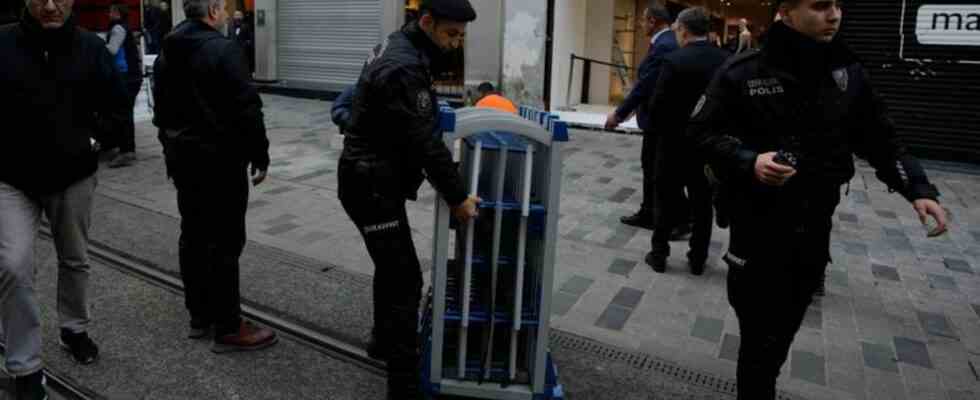Turkey
Suspects arrested after Istanbul bomb attack
The Turkish police have reopened the popular Istiklal pedestrian zone. photo
© Khalil Hamra/AP/dpa
A bomb explodes in the tourist center of Istanbul, killing several people. During the night a suspicious person is arrested.
After the attack in Istanbul that killed six and arrested a suspect, the police released further details. The alleged assassin is Syrian and has admitted connections to the Syrian Kurdish militia YPG, the police said. Turkey equates the YPG with the banned Kurdish Workers’ Party PKK.
The PKK is on the terrorist lists in Turkey, Europe and the USA. The Kurdish militia YPG, on the other hand, is not seen as a terrorist organization by the USA, but is seen as a partner in the Syrian civil war in the fight against the terrorist militia Islamic State (IS).
According to the police, the assassin also admitted to illegally entering Turkey via Syria. There were 46 arrests in connection with yesterday’s attack. Interior Minister Süleyman Soylu had previously spoken of 22 arrests along with the main suspect.
Six people were killed and more than 80 injured in the attack on the busy shopping street on Sunday. The Turkish government had previously stated that a woman was suspected of planting a bomb on the promenade, which is also popular with tourists. Vice President Fuat Oktay described the attack as a “terrorist attack”.
Baerbock is shocked
Federal Foreign Minister Annalena Baerbock, among others, expressed her sympathy. “Terrible pictures come from Istanbul,” said the Green politician on Twitter. “My thoughts are with the people who just wanted to stroll down Istiklal shopping street on a Sunday and have now fallen victim to a massive explosion.” US President Joe Biden’s spokeswoman, Karine Jean-Pierre, condemned the “act of violence”. “We stand side by side with our NATO ally Turkey in the fight against terrorism,” she said.
The Istiklal shopping street is a tourist hotspot in the center of the European part of the Turkish metropolis, which is often crowded even on Sundays. It was initially unclear whether Germans or members of other nations were among the victims.
Turkey rejects US condolences
Turkey’s Interior Minister Süleyman Soylu has spoken harshly to the United States in connection with the Istanbul attack. Soylu repeated his accusation that Washington supports “terrorist organizations” in northern Syria and declared on Monday: “We do not accept the condolences of the American ambassador, we reject them.” Like other missions abroad, the US consulate and embassy had sharply condemned the attack that left six dead and expressed condolences to the victims.
According to the Turkish police, the main suspect arrested in the attack on Istiklal shopping street on Sunday is from Syria. She said she had received her “order” from the Syrian Kurdish militia YPG. Turkey sees the YPG as an offshoot of the banned Kurdish Workers’ Party PKK. The USA, in turn, sees the YPG as a partner in the fight against the terrorist militia Islamic State (IS) in the Syrian civil war.
News blackout imposed
Most of the reporting on the attack was stopped in Turkish media. The Rtük broadcasting authority imposed a temporary news ban on the media. Reports of the explosion should be avoided so as not to cause fear and panic among the population, the letter said in the afternoon. The Authority for Information Technology and Communications (BTK) also reportedly reduced the bandwidth for social media platforms in the evening. For users, this meant that pages were significantly slower or only accessible via VPN.
PKK is on the terrorist list
There have been repeated attacks in Turkey in the past – including in the center of Istanbul. In 2016, for example, a suicide bomber blew himself up on Istiklal, killing four people and injuring 39 others. According to the Turkish government, the assassin had connections to the Islamic State (IS) terrorist militia. The group itself did not confess to the crime at the time.
The banned Kurdish Workers’ Party PKK has also repeatedly carried out attacks in Turkey. The PKK is on terrorist lists in Turkey, Europe and the US, and has positions in south-eastern Turkey and northern Iraq. Their headquarters are in the northern Iraqi Kandil Mountains. Ankara regularly takes action against the PKK and has maintained military posts in northern Iraq since 2016.
The conflict, which has been going on since 1984, has so far claimed the lives of tens of thousands of people. A ceasefire failed in the summer of 2015.

